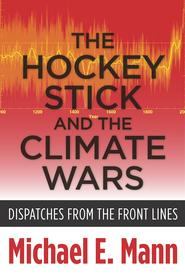
Michael Mann, professor of atmospheric science and director of the Earth System Science Center at Pennsylvania State University, and leading author on several influential reports and books, lectured on April 4 about his role in the “raging contentious debates” over climate change. The “debate,” he argues, is unfocused, since the existence and importance of climate change is not contended within the scientific community.
Despite the lack of scientific contention, a large portion of the population denies climate change. So he began by countering the most common myths about climate change.
First, some deny climate change because they argue we’ve been experiencing record levels of cold. But in fact, Mann has collected data from a number of cities across the country and has come to the conclusion that this is simply false. In all of these cities, “extreme cold is getting less and less common.” And even when looking at the heavy snowfalls in the past few years, especially in Boston and D.C. this winter, and Buffalo last winter, they corroborate, rather than contradict, an increase in global temperature because of how the increased water temperatures leads to increased moisture in the air, which in turn leads to increased snow fall.
He also addressed the claim that our climate change models are untrustworthy because they have not been properly tested. Mann pointed out the ludicrousness of this objection, at first based on the fact that we’re already “engaged in an uncontrolled experiment with the one planet we have” and secondly because the models are actually quite reliable. He referenced one prediction made in 1988, which has proven to be incredibly accurate, especially given the remedial nature of those models in comparison with the more sophisticated models we use today.
Moving forward, Mann urged immediate action, so that we might not break a crucial threshold, a temperature increase of 2 degrees Celsius per year. According to Mann, we are on track to consistently break that threshold (and in fact did in the month of February), which most scientists agree will mark the time when significant consequences of climate change begin to take effect. In order to curb this trajectory, Mann scolded politicians who accept money from fossil fuel companies in order to lobby against the clear and undeniable science as well as those who target and intimidate scientists in an effort to bury the scientific evidence.
Most importantly, he urged the audience to see climate change not as an issue of economics and policy, but rather as one of ethics. How we react and respond today will have a direct impact on the lives of generations to come, and if we do nothing, we will see a fundamentally “different planet” by the end of the century.
Posted April 6, 2016
